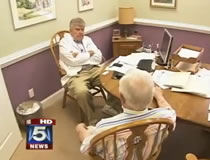October 15th, 2014
Wearing Dentures During the Night Increases Risk of Pneumonia
Wearing dentures during the night increases risk of pneumonia
Oct 13,2014
When elderly people also wear their dentures during sleep, they have a higher risk of developing pneumonia. Japanese scientists arrive at this conclusion in their study published in the "Journal of Dental Research". Oral inflammatory markers were also higher.
Researchers at the Nihan University School of Dentistry in Tokyo examined the oral health and oral hygiene behaviours among 542 elderly persons (228 males, 296 females) with an average age of 87.8 years. 453 of the participants were denture wearers, and of these, 40.8 per cent also wore their dentures at night.
During the three-year observational period, 48 events involving pneumonia were identified, of which 20 were fatal. The analyses showed that wearing dentures overnight as well as swallowing difficulties significantly increased the likelihood of developing pneumonia - in fact, the risk was 2.3 times higher.
Moreover, those who wore dentures while sleeping had more tongue and denture plaque, higher inflammatory markers on their gums and exhibited increased levels of the fungus Candida albicans as well as higher circulating IL-6. According to the authors, elderly patients should therefore be urged to remove their denture during sleep.
References
Journal of Dental Research (abstract)
- March 30th, 2014
What is HIGH BLOOD PRESSURE (HYPERTENSION)Read - August 17th, 2014
Bisphosphonates Increase Risk of Incident AFRead - February 4th, 2014
I TOLD YOU SO..... Testosterone Therapy Prescription Linked to HEART ATTACKSRead - June 24th, 2015
Inhaled Levodopa Improves Motor Function in Parkinson'sRead - August 12th, 2012
Study: No PSA Tests, Advanced Cancer TriplesRead
Geriatric Nutrition
Without good nutrition, positive drug therapy outcomes are very difficult to obtain, For the best in Geriatric Nutritional Information
Find out more Optima SolutionsContinuing Education
Each month we will post an analysis of specific aspects of government long-term healthcare regulations.
Find out more


